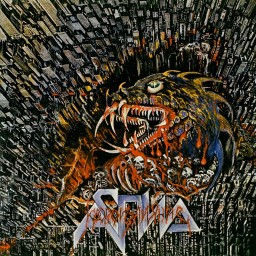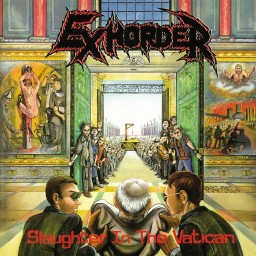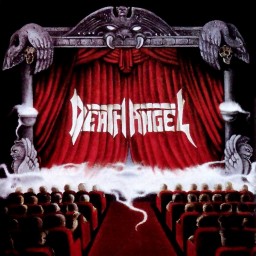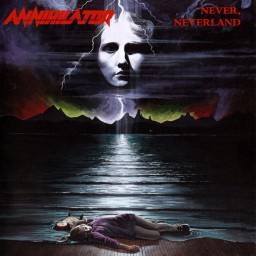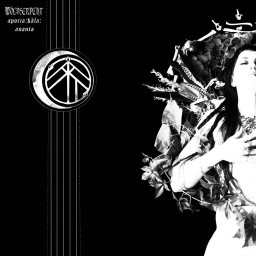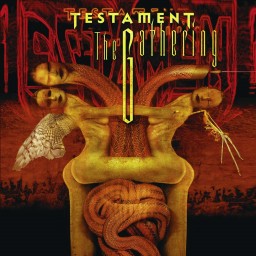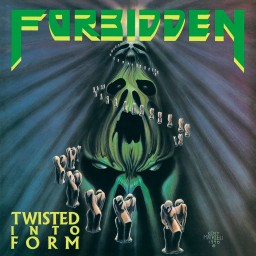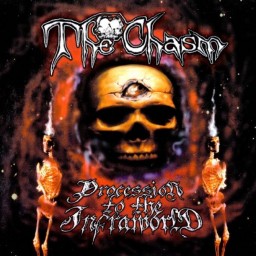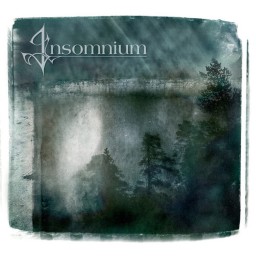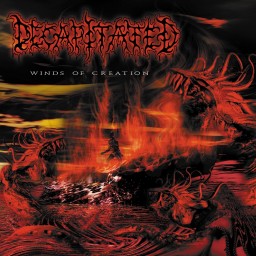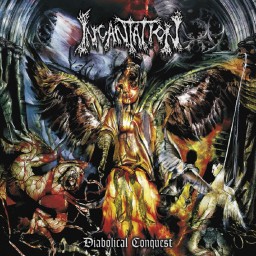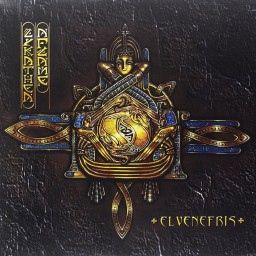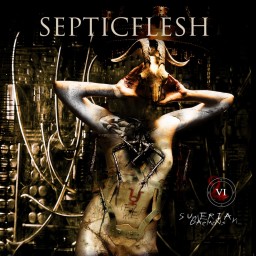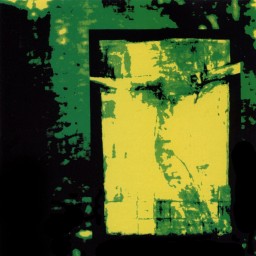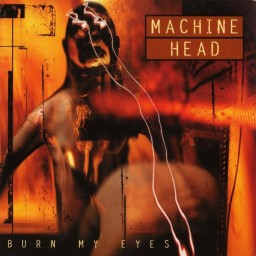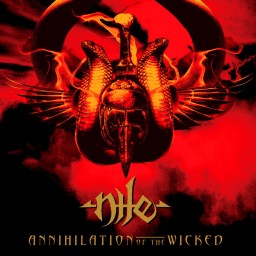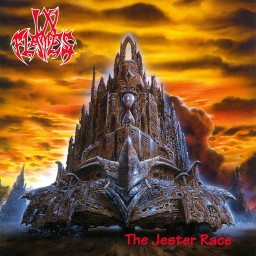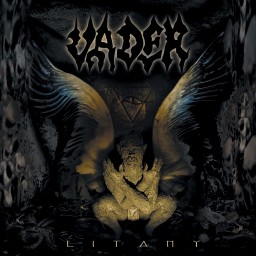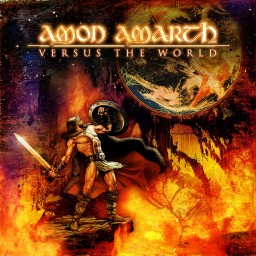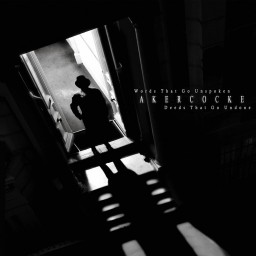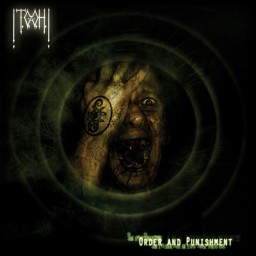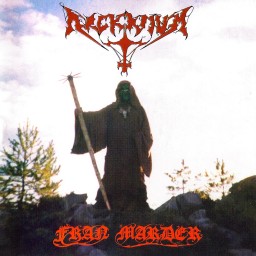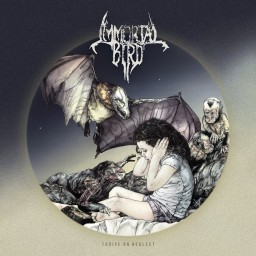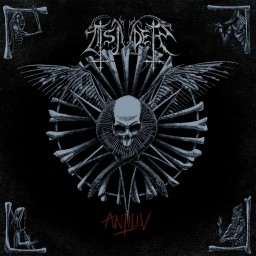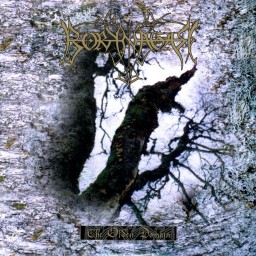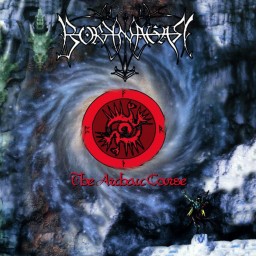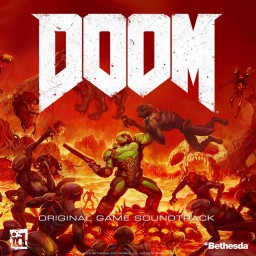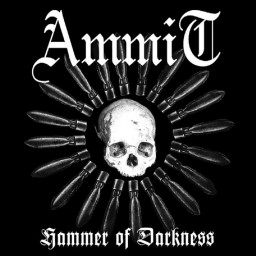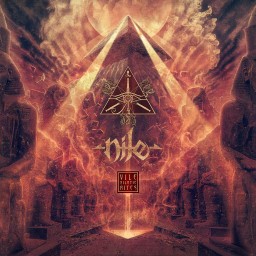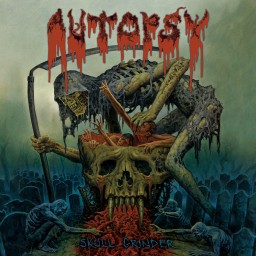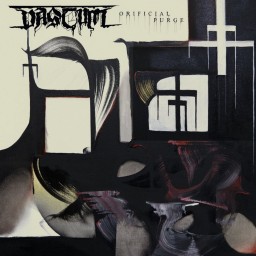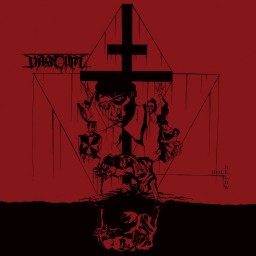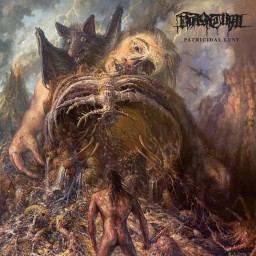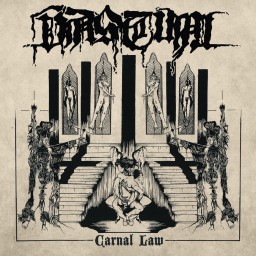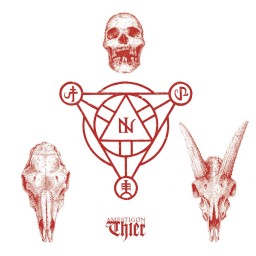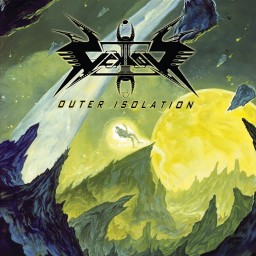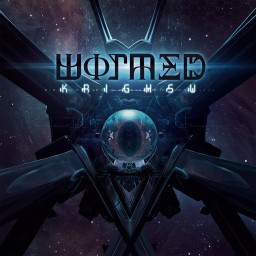Vinny's Reviews
The symphonic opening to this record belies an allusion of grandeur. It does come across as quite amateur though with its clumsy composition and goes on a bit too long. Thankfully after the opening two and a half minutes of pomp, track two starts the album off proper with a scathing riff that brings the promise of exploration of the technical side of thrash metal. The problem is though that it is just as guilty of going on and on with the same idea as the opening track was. The blackened vocals, sang in the native Russian tongue of the band are the only obvious positive in the opening few minutes of the seven minute plus track. For the majority of the song, the band seem to stick to the same repeated progression, layering in more prominent bass sound at times to give the only real variation to the by now tried and tested formula. By the time the (excellent) solo kicks in I was more than ready to skip to track three but the lead work rescues this track nicely.
This was Aspids only release in a career that spanned an initial nine years (with a brief return in 2010). It sounds like a debut album from the 90's released on a small label. The production values are suitably sparse but the mix stabilises all instruments well and the pacing and structure of the album overall show signs of a band able to progress beyond their first venture onto full-length together. Unfortunately the band dropped of the scene altogether some four years after this record was released with only the drummer seemingly active in metal music at all in recent years.
The racing tempo of track three (this is all in Russian hence I am not naming tracks by title) delivers a ripper of a track for lovers of the more aggressive style of thrash. The band sound like a cohesive unit on this track and the structure is a little more obvious and ordered, relying less on progressive elements to get it over the line, instead relying on solid riffs and high energy levels.
There's elements of Coroner on here - albeit not as well delivered - but also you can here bits of Sadus and Athiest too. The smatterings are there but this never quite reaches the odd progressive style of Voivod (thankfully) and the band are able to exhibit a variety of influences on their sleeves throughout the record. They only come unstuck when attempting these bungling attempts at symphonia or unnecessary atmospherics which are simply not required when the bands obvious strengths lie in their cohesive musicianship using riffs and progressions to build tracks.
Despite not understanding one word of what they say, I do feel a real sense of storytelling across multiple tracks on this album which is a remarkable and unexpected feat. The grim and angry vocals express the darker side of the release superbly and give proceedings a real sinister edge. This album is another example of a record that I had no idea even existed and following the Clan Challenge has led me to an interesting new discovery to add to my collection.
Genres: Thrash Metal
Format: Album
Year: 1993
The obvious vocal similarity aside, I see little in the way of comparable elements between Slaughter in the Vatican and Cowboys from Hell, the latter of the two releases for me far outreaches the debut effort from Exhorder and I think they are two very different sounds in fact. Notwithstanding the fact that I grew up with Cowboys... and it was instrumental in defining my journey into metal so it is unlikely to be ousted from the top spot anytime soon.
Again, as with my thoughts on Rust In Peace, I find Slaughter in the Vatican to be overrated. I feel little in the way of any compulsion to revisit it much after the odd play it gets now and again, but this isn't because it is a bad album more the case that I just don't feel captured by it. There's riffs and chops and hacks all over it, equally the energy levels are consistent and the musicianship is tight enough to carry it all off. I still don't get anywhere near the levels of excitement from it that the various reviews on the internet seem to indicate are present.
I think part of this is the "cult" status the album seems to enjoy as being another band that did groove metal around the same time as Pantera did and this I think has led to the unnecessary and inaccurate tag of "underrated classic" being applied to the album. To these ears at least it is not that and the record just needs to be acknowledged for its solid base and equally robust structures that occasionally break out into well paced and aggressive thrash metal to grab my interest. Unfortunately though the majority of this record just passes me by.
Genres: Thrash Metal
Format: Album
Year: 1990
Mediocre. That's the word that comes to mind whenever I hear the band name, Death Angel. Largely this is because of the complete lack of punch to any of Mark Osegueda's vocals. He has always struck me as lacking any range or true power and this has always in my mind held the band back from climbing the popularity stakes in my thrash metal preferences.
Act III seems to suffer worst of all their releases, I mean as an example, quite what the band were thinking when they recorded Veil of Deception is beyond me. Placing it as track number three on the record certainly makes if far too prominent in the line of sight and disrupts the flow of the album completely. Having started well enough with one of the first thrash tracks I ever saw the video to with Seemingly Endless Time things take an instant dive with the energetic yet clunky Stop. But even early on in the album there's obviously very little in the actual way of thrash metal. And here lies the problem! This isn't a thrash metal record, not really. I mean yes, there's some attempt at riffing on The Organisation but it doesn't set the pulse racing. It is all so underwhelming.
The funk element to Discontinued really grates which is a shame because bass slapping aside it is actually one of the more riff orientated tracks. Unfortunately it just feels like the band are trying to be experimental beyond the boundaries of their actual talent or skill levels. Two (yes fucking two) ballads on a thrash metal record? Give me a break chaps.
Whenever the record starts to give glimpses or glimmers of hope to me there always seems to be something unsatisfactory waiting around the corner that disrupts or completely destroys the flow which suggests to me that even at album number three the band still were not that good at songwriting and learning no real penchant for their chosen art form.
Genres: Heavy Metal Thrash Metal
Format: Album
Year: 1990
I found it disappointing that Annihilator couldn’t keep the late Randy Rampage after their debut album. His unhinged and almost demented style was a real draw for me. Although at times it was a bit clumsy, his vocal delivery was intentionally so and worked really well. It gave an added edge to the great guitar work and solid rhythm section that opened up the interest factor that bit more.
By comparison Coburn Pharr’s effort on the follow up, paled in comparison. Upon my first few listens they dominated my focus on the record and detracted from me listening to the bigger picture. I would say that overtime I now get the positives of them but I still will always prefer Rampage. The fact is though that despite the often preachy and even cringey vocals of Pharr, they do fit the music. The ecological, supernatural and political themes throughout the record serve as a good platform for him to add character to proceedings. They work brilliantly on the title track with its fantasy theme just as well as they do on the more climate-change charged Stonewall. They suit to the military precision of Sixes and Sevens. I still am not enamoured with them though and do act as one of the main reasons this album gets the rating applied.
The other reason for the stars given in the rating is the inconsistency of the record. There’s a fair bit of filler here as the album goes on and tracks like Kraf Dinner just really grate. Criticism aside the album still displays quality musicianship, especially from Waters and overall remains enjoyable. Considering where I was the first time I heard it the fact that I have kept in my stream is actually a real vote of confidence.
Genres: Thrash Metal
Format: Album
Year: 1990
Wolvserpent are an odd duo in terms of the often life or death choice of where to put a band based on their sound. The anally retentive readers amongst you may have a full blown aneurysm trying to safely store this complex blend of doom, death, black, drone, folk and harrowing classical influences into a safe and neat little pigeonhole. Add to the fact that this latest release (still not typing the proper title) is actually a 40 minute single-song composition that takes you through everyone of the above listed experiences at least once and your heads may even pop. Take my advice, create an "Other" or "Unknown" folder/shelf/record box/CD tower and stick it in there.
If you are already familiar with Wolvserpent then you won't be disappointed here. It is hard to review any Wolvserpent release because there is so much going on and to be honest I still don't think that my humble words would a) prepare you for the actual experience or b) do it real justice as a piece of wonderfully composed and thought out music. It is the recording of a mental actual state, a forty minute snapshot of a parallel universe in which although it is very beautiful and mesmerising you still can't fight the feeling that something wicked could come this way at any moment. In every sensation tingling moment of surreal transcendence there's a niggling doubt in the back of your head that a looming black cloud of nefarious torment is not just about to sweep in on the westerly wind.
It is safe to say that the track takes you on a journey, which is basically what all music should do.
Genres: Drone Metal
Format: Album
Year: 2016
Loosely speaking, there's probably nobody else in thrash with a vocal style that is vaguely similar to the gruff utterances of Chuck Billy. His voice is unique and powerful and really gives a perfect edge to any metal music really. I have often thought he would suit a more aggressive style of thrash than what Testament plays. From the opening track of this album his vocals are the commanding force over what is otherwise a very average sounding track in D.N.R. (Do Not Resuscitate). It is not until the thrashing frenzy of Down for Life that the vocals and frantic riffing marry perfectly to make for one of the best tracks on this record. The track sounds full of energy, certainly in comparison to the stuttering nature of the opening track. The only thing the track is missing is some wild solo to polish it off fully.
The promisingly titled Eyes of Wrath fades up slowly to an atmospheric start before becoming another strongly written thrash attack. The track does meander a little though which is a shame but even its quieter moments don't ruin the mood too much. We do get a weird, almost psychedelic solo to end the track this time which adds an air of mystery to things and sets up the equally mysterious sounding True Believer.
The album seems to be going from strength and builds in stature with each track, the groovy 3 Days In Darkness progresses things superbly with its catchy tones and memorable structure. Legions of the Dead is a bit of a short, sharp shock to the flow of the album but doesn't make too rude an intrusion on proceedings. The steady and again catchy riffs of Careful What You Wish For has an almost nu-metal undertone to it and is the first track that really doesn't fit into the development of the album from track two onwards.
Riding The Snake puts things back on track to some degree but this is were the weakness of the album starts to show. I think it runs out of pace just after halfway through, notwithstanding that there's still some great moments left to come, but as a whole album I think it starts to feel like it should be almost over by this point like there's obviously very little left in the legs but somehow it keeps going for eleven tracks (twelve on some versions).
Genres: Thrash Metal
Format: Album
Year: 1999
Following on from my theme of my general dislike for every vocalist Anthrax ever have had, the main problem I always had with Forbidden was vocalist Russ Anderson. His unremarkable vocals and frankly laughable style was always a massive turn off for me. Whilst it is true that I like my thrash metal to be on the heavier side of things, I am not averse to the lighter approach used by some bands but I am nearly always intolerant of weak vocals.
I came to this record like most people did, of the back of hearing Step by Step and succumbing to peer pressure and checking out the whole album. The aforementioned track isn't even that good in reality so the writing for the whole album was already on the wall in some regards. The album opens well enough with the light strings of instrumental piece Parting of the Ways providing a gentle introduction into the more frantic and thrashy Infinite and it obvious from the off that Bostaph is present on those skins as he provides a solid backdrop for the largely robust thrash metal that the band always were capable of delivering.
But as soon as Anderson opens his mouth all the positives are forgotten. His mix of spoken (almost rapped) vocals combined with the more traditionally sang parts is reminiscent of a drunken man shouting nonsense in the street after all the pubs have closed. I can't think of many more bands whose vocalist just kills the whole sound of the band for me. Despite the obvious talent of Locicero and Calvert their riffs and sterling lead work is just trashed by the vocals. Who thought the structure of Out of Body was a good idea? It is cumbersome, disorganised and frankly amateur.
And so it continues over all nine tracks, the band build solid enough foundations only for them all to be knocked over by Anderson within mere seconds of them starting.
Unsurprisingly I haven't explored anymore of the Forbidden back catalogue since my first listen of Twisted Into Form.
Genres: Thrash Metal
Format: Album
Year: 1990
Fittingly, I get to finish my Horde Clan challenge on a high note. Mexican death metallers, The Chasm are the brainchild of Daniel Corchado of Cenotaph and at one time Incantation fame. The version of death metal that the band plays lies rooted in the influence of a variety of bands from Morbid Angel to Nocturnus, from Funebrarum to Deceased. For every moment of raging death metal there's a horrific, cosmic absurdity there underpinning some of the proceedings here also.
The sonic chaos that the band invokes throughout Procession to the Infraworld is blinding. The leads soar and swarm at the same time, enveloping the listener and asphyxiating any remnant of silence in their path. The riffs are equally smothering and consuming, crawling over your flesh like plague infested arachnids. Check out At the Edge of the Nebula Mortis for a great example of this.
Corchado's vocal style is different to the one he deployed with Incantation on Diabolical Conquest, having an almost Abbath like feel to them at times. Considering that this album was released a mere two years after he worked with the legends of death metal, the versatility that he is able to display is great and the performance here feels very measured and calculated to maximise the vocal's emphasis in the bigger picture of the overall music.
Between Corchado and Viterbo the guitar work here is excellent displaying variety and surety in equal measure, never flashy or showy but always entertaining in weaving the album's own particular tapestry of cosmic chaos. Antonio León on drums does a superb job also in making the percussive elements of the record sound robust and vigorous throughout, using subtlety where required and power when called upon also. The solo for Return of the Banished is a perfect example of when the guitar is allowed to breathe by the other instruments.
I don't know where the Infraworld is precisely but I am joining the procession to get there if this is what the soundtrack is going to sound like!
Genres: Death Metal
Format: Album
Year: 2000
With melodic death metal not being my usual poison I have found working my way through this particular site challenge to have unearthed some surprises. Insomnium are one of the bigger unexpected sources of entertainment for me, having heard the name on numerous occasions but never getting round to see what the fuss was about I was pleasantly surprised by Since the Day It All Came Down.
First off, this is a very mature sounding record which considering it was their sophomore release was a very promising start. The songwriting throughout the album is a real treat in terms of composition and construction. There's layers in spades here, building melodies before pacing them with the more aggressive tempos of most tracks. The leads feel melancholic and harrowing adding real atmosphere to the storytelling.
The balance to the pace and tempo overall is good but at times is does all sound a bit samey. Often the record reminds me of a slightly more talented Amon Amarth, some of the riffs are that repetitive. It feels like the band found a winning formula and overused it somewhat. This is a shame because as already stated there's obvious talent here but it just seems to get stale in places.
When not resting on established methods the album does develop real textures in places and did stop me in my tracks on a couple of occasions to take note of such particular moments. All in all though, the work involved in sitting around waiting for the more adventurous moments is taxing for the reward provided. Songs like The Moment of Reckoning lack any sensible direction and just repeat the same chorus in two different styles, one grim spoken word the other more death metal style vocals and it is almost laughable notwithstanding the fact that the music on the track itself is actually quite good but the vocals remove all sense of enjoyment.
For all my gripes and grumbles there's still a decent enough record here, it just doesn't set my world on fire.
Genres: Death Metal
Format: Album
Year: 2004
If I am honest there's a list in my head that is loosely titled "Albums to kick yourself for all eternity for not owning". Near the top of that list is this record. Currently it is absent from all streams even and so I had to dig to find any stream of it on the internet, however after I write this review I am off to find a physical copy and reduce the aforementioned list by at least one.
The urgency and immediacy of Winds of Creation is extraordinary from the very off the album imposes on you it's agenda of technical and bludgeoning death metal. This is the only Decapitated release I have any real time for because it is just so freaking well put together and has a feel on most songs of the pace just gathering and gathering yet never once does the arrangement of any track or the album as a whole suffer for it.
Even more impressive is the fact that this is the band's debut full length. Drummer Vitek was only sixteen years old when they recorded this album and even at that fledgling age the boy was a fucking beast. Likewise, bassist Martin was only seventeen years of age and the two oldest members (Vogg and Sauron) were still only nineteen. To be able to put together such an accomplished release so early in their careers is a triumph in my book but when you add the age of the members and their musical prowess to the fact then it becomes almost mind boggling.
Vogg's riffs are monstrous affairs. Relentless in their delivery and yet so well paced throughout the seemingly ever increasing tempo of each track it is not hard to see why this man was under consideration for Morbid Angel when Erik Rutan left. This man is a talent and his sonics are so well placed and quickly delivered that they provide near respite from the raging intensity around them. Vocalist Sauron has the academic title of Master of Musicology from Jagielonian University (come on, who doesn't want that title before or after their name?) and grunts his way through eight tracks (the ninth track being an instrumental) as a perfect accompaniment to the raging death metal being played.
Right, off internet shopping...
Genres: Death Metal
Format: Album
Year: 2000
In a discography of varying quality of output, Diabolical Conquest might just be the best record Incantation have ever released. This is in no small part down to Daniel Corchado (of The Chasm) delivering a sterling performance instead of original vocalist Craig Pillard who had by album number four departed from the band. Corchado also played guitar and bass here too and he (and indeed the whole band) sound sharp and on top of their game. The bass thunks and rumbles throughout and gives a real sense of atmosphere and threat to the tracks.
Gone are the more murky elements to the band's sound, even the more doom-laden sections are more coherent somehow with the riffs sounding clear and imposing as opposed to lost in some maelstrom of chaotic mixing. As a result there's an edge of optimism to the sound on the album, not happy smiley-face optimism, more of a satisfaction that the band is working as a unit and ideas are coming to fruition well.
Losing none of their trademark power and baleful atmosphere, Incantation kind of cleaned up their act somewhat on Diabolical Conquest but still were instantly recognisable as the band fans had grown to love over the preceding eight years of their existence. They embraced the new blood and ensured they maximised the benefit of having an experienced and talented addition like Corchado in the ranks. It was a shame that John McEntee couldn't convince him to stay longer than just one album as the output for the years since has fallen way short of the quality of this album.
Let's acknowledge that this wasn't just the Corchado show though. McEntee's natural ability to constantly express himself through death metal is as strong as ever here in both his playing as well as his song and lyric writing. Likewise, Kyle Severn gives a strong performance on his first Incantation studio album, blasting his way effortlessly through each track.
Probably the last great Incantation album right here folks. Add it to the collection if not already in there.
Genres: Death Metal
Format: Album
Year: 1998
This album might just be one of the best death metal albums ever written. To say that it is a varied and challenging piece of technical, brutal and progressive death metal is perhaps an understatement of gargantuan proportions. There's no half measures here, if you're going to listen to Elvenefris you're gonna need to give it your absolute attention, otherwise you are going to end up lost as it undulates and surges through over an hour of some of the most well constructed death ever put to record.
Astonishingly, this was the band's only output. Since Elvenefris the band have been in an unknown state, occasionally surfacing with the promise of new material but never quite getting around to delivering. Perhaps they are still recovering from making this record?
The band were (are?) a collection of largely unknown artists at the point of the release of this record in 2000. Their time as Appalling Spawn saw them make one album in 1998, but after some line up changes they became Lykathea Aflame (although rumour has it they are now known as just Lykathé. Since Elvenefris only drummer Tomáš Corn has worked outside of the group turning up in epic Black Metallers, Cult of Fire. His performance on this record is notable for its technicality and sheer speed alone. He almost reaches Mounier like proportions of bashing at times although his drums do sound somewhat tinny in places on the record. Despite this he is key to driving forward the machine that is Elvenefris over eleven tracks of intricate and arcane music that never stops being entertaining.
The vocals are of the brutal and guttural variety. Ptoe also brings the odd clean/spoken word vocal in throughout the record and this shows his versatility in creating mystery as well as bestial utterances. There is also sensible use of keyboards here to boost the atmosphere and create the varied textures of the record. The band made good use of Ptoe's brother and also Pavel Marcel as session artists to build these atmospheres into the robust structures already being built by the band.
The real triumph on the album though for me is the guitars. Able to comfortably work with a variety of styles, Ptoe and Martínek combine superbly to make their work the crowning glory of the whole record. Applying a deft touch where required and just as easily ramping up the raging riffs for the more brutal death metal parts, they show an aptitude for not just metal music but world music also - check out the far eastern sounding passages that are littered throughout the record - that adds real depth to the record.
The album never goes avant-garde like a Dan Swanö record would do, retaining death metal as its core sound throughout and for this reason always feels familiar despite its variety and diversity.
Genres: Death Metal
Format: Album
Year: 2000
I struggle to find Septicflesh releases that I like. To date my (patchy) exploration of their discography gleaned only Codex Omega as being of any note. For me, all too often, the promise of the grandiosity of a symphonic death metal record always fell short. I won't go as far as to say it works brilliantly on Sumerian Daemons end to end but it most certainly works for the bulk of the record.
The first thing to mention is that I am not entirely happy with the mix on this record. I find the vocals sound a little muffled and the drums a little dominant in the mix. It isn't a massive distraction but I do find it is worse on some tracks than it is on others. Mixing job pickings aside this is actually a decent enough death metal record even before the added splendour of the symphonic elements. It rips nicely and sets a frenzied pace at times that holds up well.
One thing of particular note is the clever use of the guitars to create atmosphere, even in its most frenetic moments there is always a haunting picked string on the fringes of the music. It feels sinister, like something is lurking in the shadows watching as the album progresses. On other occasions the record has a real rock feel to some of the riffs deployed (Dark River) which surprisingly works really well alongside the overall death metal aesthetic of the sound. It is how I would prefer my melodic death metal to be largely.
There's a definite strength to the songwriting and a prowess to the performance - which is only to be expected. There are moments where the record does meander a bit but on the whole it is a solid record that makes subtle use of the symphonic elements to let them contribute to the whole sound as opposed to riding roughshod over the record.
Genres: Death Metal
Format: Album
Year: 2003
The furious grindcore of Dying Fetus never sounded more alive than on their 2000 album Destroy the Opposition. Full of chugging riffs and soaring technical wizardry it really is a release that epitomises the Dying Fetus sound perfectly. The technique the trio are able to exhibit on this record is unbelievable. Opening track Praise the Lord (Opium of the Masses) opens and closes with an almost hardcore riff that bounces along but during the intervening five minutes the track goes off in a much more aggressive and technical direction.
There's a real sense of things feeling tight and sharp throughout the whole opus, like the band are really hitting their stride. The grim grunts compliment the riff structures brilliantly and the blasting fury of those drums feels like a volley of artillery in the face. Whist undeniably brutal that brutality is not necessarily just in the sound, in fact it is integrated and contained really well in the sound. There is a sense of more calculated brutality, applied with real aplomb to the recording. Dying Fetus aren't here to fuck around.
I came to this record late, having only discovered the band via their excellent 2012 release Reign Supreme. working back through their discography gleaned little in the way of equal magnitude until I got to this release and I think both records follow the same format of balancing brutality with technicality although I would argue that the latter of the two releases is marginally superior.
Genres: Death Metal
Format: Album
Year: 2000
There's a knack to the avant-garde in terms of how measured you want to be with the more experimental aspects of your sound. Swanö and co. here have the tap on full and are just letting the innovation pour out. It does get to the point of nearly overflowing on more than one occasion but never quite becomes a flood.
The death metal parts are great and create all the necessary walls of noise you could ever want to hear on any death metal record. The effects/saxophone/whatever else is going on here do often sit in complete juxtaposition to the rest of the music, which is sort of the point of course. Whilst this is necessary for the overall direction of the album, I find it hard to believe that all of it is needed. There are times when it just sounds experimental for experiments sake and it doesn't really bring anything to the record.
My favourite track on the album is not even a death metal one. Behrial is a kind of ambient piece, using keys to great effect to create an almost Jean Michel Jarre esque soundscape. It is the most settled and assured piece of music on here by a long chalk. It sounds like it perhaps was recorded by a different artist or was mean't for another record altogether though, despite my enjoyment of it.
The album is well named and not many fans would pick this up and expect a familiar structure of death metal like you would on a Cannibal Corpse record. It does however come off as being a tad too chaotic and confusing for me.
Genres: Avant-Garde Metal Death Metal
Format: Album
Year: 1996
This is the album that seemingly half the fan base of early nineties metal have been waiting to be followed up for over 25 years now. Rarely do I hear conversation or read reviews of Machine Head output post this record that doesn't mention the debut. "This ain't no Burn My Eyes!" is one such common comment as if there is a genuine expectation that anything is ever going to match one of the most impacting and meaningful releases for most fans growing up with metal in the nineties. As is perhaps human nature, the success of a band at one moment in time becomes a stick to beat them with in years to come.
The majority of criticism that gets levelled at Machine Head is justified in my book, not that there is anything wrong with a band exploring new avenues and directions but with Flynn's unpredictable nature there is always a threat of you just not knowing what is coming next whenever a record release from the band is announced. This (aside from the fact that I believe that Burn My Eyes was a one off record anyways) should be evidence enough that the debut was never going to ever get followed up in the strictest sense of the term. Instead we should celebrate the brilliance of the debut as opposed to chaining it around the neck of the band like some wearisome burden.
By the time this record was released I had been into metal for five years and things were just starting to get a little stagnant for me. Nu-metal was in the early stages of development and I had already decided it wasn't going to interest me that much. Virtually every penny I earned went on vinyl, CD or cassette and my shelves in my bedroom were stocked full of everything from Pantera to Morbid Angel, from Bon Jovi to Judas Priest and I felt like I heard everything. My liking of Pantera was what I recall being the thread that lead me to Machine Head's debut album. A Vulgar Display of Power had been a big influence on my taste in terms of groove metal and Burn My Eyes seemed almost a natural progression for me. The record felt fresh, brimming with angst-ridden energy and brooding violence. It sounded like how I (and no doubt every teenage metal fan at the time) wanted their own band to sound like if they ever started one up. It was equal parts catharsis for the moody teenager as it was unbridled vehemence for the older hormones floating around in my blood at the time.
The tracks just stacked up like a string of devastatingly powerful wrestlers making their entrance one by one into some all out royal rumble. It was most definitely an album that in 1994 I would have awarded five stars to. A quarter of a century's worth of hindsight has seen the number of stars diminish as my tastes have changed and I rarely come back to this record with any regularity nowadays. I still stick to my point earlier on in the review that this record should be celebrated for what it delivered to both me personally and the metal genre as a whole at the time. It is still a brilliant and very important album.
Genres: Groove Metal
Format: Album
Year: 1994
My introduction record to Nile, their fourth full-length offered a brilliant gateway into their brand of technical and brutal death metal. Vast though it seemed in scope at the time the whole experience felt varied and accessible still. Whether it was the far eastern promise on the strings or the looming beastly riffs that cemented the death metal credentials of the record, there was enough ability on show for the record to gain instant respect from this listener.
For me this record completed the band's golden run that started with 2000's Black Seeds Of Vengeance. It engaged all the brutality of the preceding two records but also showed a much more mature and skilled delivery, complete with a story-telling to the song writing that made the whole experience even more compelling. The multi-instrumental wizard that is Karl Sanders leads brilliantly on this release. His supporting cast of Toler-Wade, Vesano and the brilliant Kollias play sterling roles in the execution of the album and Kernon's production job lets the music come across as vibrant as Landau's artwork suggests it will be.
The band for me went into a bit of a decline post-Annihilation of the Wicked culminating in the decidedly ordinary Vile Nilotic Rites in 2019. But their 2005 release was a triumph in both design and content and is an album I still visit with regularity to this day.
Genres: Death Metal
Format: Album
Year: 2005
So here's a turn up for the new year, a melodeath album that Vinny actually likes! "Where is the real MacabreEternal?" I hear you cry, "We demand his safe return immediately!"
In terms of the Gothenburg scene At The Gate's The Red In The Sky Is Ours was my pick of the scene, with its demented vocal style being of particular note for me. In Flames somehow passed me by until this past week and after a couple of spins of The Jester Race I am sold on this particular slab of melodeath.
What this record does so well is balance the melodic elements so very well with the death metal parts. Whereas the Dark Tranquillity style of melodeath feels awash with keys and polished riffs, at this stage of their career In Flames has a more core death metal feel to proceedings. It is still very melodic but it is integrated so well into the mix that it carries so much better.
There's a variety of influences present here too, ranging from progressive sounding follies to acoustic musings as well as incorporating flagrant rock riffs to boot. The record is written with a skill that often belies a band just three years into their existence at the time. For a bunch of guys in their early to mid-twenties there's a real maturity to proceedings over the ten tracks on display.
I have started 2020 off with a neat new discovery (albeit a 24 year old album)! I clocked the 2014 digipak, The Jester Race + Black Ash Inheritance with bonus tracks and live tracks also. Worth a punt.
Genres: Death Metal
Format: Album
Year: 1996
I am not Vader's biggest fan if I am honest. I find their sound to be very generic, meat and potatoes death metal that does little to stimulate the senses beyond the occasional respectful nod. I hear good things about them all the time from peers but I just can't seem to get into them with similar levels of enthusiasm when I try to sit with any one of the numerous releases I have tried over recent years.
Litany doesn't really change anything as I revisited it recently and still unlocked no further entertainment than with previous outings. Vocally I find Peter to always sound like he is struggling, his gruff style not really ingratiating the bands brand of death metal with anything robust enough to make it sound authentic. This is not to say that I am expecting a range in his vocals - it is death metal after all - but they just don't hold up.
Musically the pace is there and the aggression too, but it all just sounds the same and only really is discernible as different tracks due to the leads. That having been said the lead work is of good quality, not earth shattering or game changing, just competent. And herein lies the problem. I listen to a lot of music and like most people have to fit that in around my busy work life and equally chaotic home life. Therefore music has to be really good to make me take time out of my day to acknowledge how good it is. If I am in the middle of cooking a meal or working on a document for work then only the exceptional stuff gets to distract me, I don't have the attention capacity for the ordinary or mundane. This doesn't make the records I attribute such scenarios to bad as such, just not good enough.
Litany won't make me burn dinner or forget to send emails anytime soon I am afraid.
Genres: Death Metal
Format: Album
Year: 2000
I have always considered Amon Amarth's output as being little more than background music. In terms of consistency they are like a melodic version of Cannibal Corpse - light years apart in sound but in terms of being able to largely predict the quality of each release they are very much similar in comparison. That isn't to knock their work ethic. They don't put out bad albums per se, they just largely all sound the same and whilst obviously capable musicians there's never much effort expelled to push their boundaries. Like the aforementioned more extreme band, in comparison both enjoy much success from a loyal fan base who eat up their releases time and time again. For me though I struggle to get excited by much of Amon Amarth's releases and Versus the World is no different.
The same format stays for all songs on offer here. Melodic, plodding death metal that has no progression or real sense of urgency or drama to it. It is true meat and potatoes melodic death metal and I fully understand why fans love it but after three tracks the boredom sets in and I find my mind wondering and my attention waning. All the grandiose song titles such as Death in Fire, Where Silent Gods Stand Guard and Bloodshed give me hope that the content is going to live up to imagery that the language used builds in my head, but sadly I just feel underwhelmed on each occasion.
Similarly, the epic artwork on the front cover made me want to explore the album despite knowing the experience I would invariably have. On this front Amon Amarth remind me of Manowar; another band I have never really got the goofy appeal of. They appear to talk a good game, but the delivery is off. The promise and intent is no doubt genuine enough but the reality is underwhelming at best.
Genres: Death Metal
Format: Album
Year: 2002
The progressive, blackened death metal of Akercocke is a lot to absorb in just one sitting. I suspect that there's literally weeks worth of listening to come with Words That Go Unspoken... based on the few hours I have spent with it thus far. The band have always been highly recommended by peers and internet acquaintances, but only now have I finally got around to dipping my toe into their calculated chaos. Safe to say, I am a convert!
The over-arching experience I take from this record is one of structure. Whilst not always linear in their narrative, the songs on display here are all built on solid foundations, carefully composed and deftly performed. As you would expect with a band with progressive leanings, pace and tempo change regularly but blend this with the excellent contrast between the cleaner passages and the more black/death metal segments you soon come to realise that there is a very clever balancing act going on here. This is apparent from the opening track. Verdelet starts with a driving and constantly building riff structure that commands large portions of the track with gothic and ethereal vocals giving things an almost new romantic edge. The black metal vocals are scathing in comparison, giving the track character and personality. Things even get a little funky as the track ends with some slapping bass audible.
This track superbly sets up the rest of the record, like a trailer to a movie should do. It showcases what to expect brilliantly without giving away everything at the first point of contact. Second track Seduced lives up to its name well with its guttural growls and blackened utterances clashing in disparate harmony over a raging wall of guitars and audible bass, their flames stoked by a constant rhythm and percussive maelstrom from David Gray (no, not that one).
By the time I got to track three it struck me that no track so far as really stopped building. They all feel just as liable to carry on forever as the previous one. This flow is no mean feat considering the plethora of styles on show here. To be able to maintain some feel of consistency whilst mixing up pace, style and delivery is the sign of talented musicians being at work. Shelter From The Sand is a whirlwind of horror movie style spoken word and wicked laughter over a vast and varied soundscape you can easily get lost in. This sets up Eyes of the Dawn superbly to take up the mantle once more of building into another aggressive and progressive death metal tune.
And so the tracks keep coming, each one of them a joy in their own right as well as all collectively making the progression of the album more intricate as they pass. There's a real feeling of completeness to the whole experience without also losing sight of the fact that this a record you'll learn more and more about with each listen. There genuinely does remain a sense of words having gone unspoken and deeds gone undone after each listen that will just have you coming back for more each time, just to make sure you haven't misheard or missed completely their passing.
Genres: Death Metal
Format: Album
Year: 2005
My first experience of this band has left me a tad bewildered. This is in no small part due to the contrast between the vocals and the music. It reminds me of a subdued Dictius Te Necare era Bethelem coupled with the technical death-grind of Cephalic Carnage. There's also some pure comedy moments in here (at least i think that is the intent) such as the sheep noise at the end of track one. As a whole it is very difficult to take in, like getting too many side orders with your main meal (which largely would satiate you on its own).
It is not to say that this record is an entirely unpleasant experience. For all its chaos and general absurdity there are some very competent and noteworthy passages and the band can certainly write a track well enough. Whether it is galloping rhythms or more progressive leanings the promise is most definitely there. All too often though things get lost under discordant arrangements that jar more than they flow.
Instrumentally speaking, the bass is audible more or less the whole of the time which certainly adds some dimension to the sound and the lead work is the activity of obviously competent players. The drums do suffer from a horrible triggered and clicking sound which in some way fits the music well but also manages to really grate at the same time.
Overall, the record comes off as a mish-mash of ideas that don't sit comfortably together in one single record. Despite there being ten songs the whole thing sounds really rushed - and not in a cool/how death-grind should be kind of a way either.
Genres: Death Metal
Format: Album
Year: 2005
Arckanum frequent the “also ran” section of my Black Metal library. They always had the authenticity and air of dark menacing mystery surrounding them but never quite had the consistency to make them worthy of regular plays. Most of their records feel like collections of songs just put together with little thought given to arrangement or overall composition. Fran Marder suffers from this perhaps the most of all the discography.
There is a real sense of constant turmoil throughout the record, but it isn’t well translated turmoil that gives the listener a sense of some emotional connection with the writer’s pain. Instead it just feels like many people turned up to the writing table with lots of ideas and the editing process lacked any real structure and more or less everything went into the record.
Don’t get me wrong, when they are on point then it is some of the finest BM you’ll hear for the era. But the work you have to put in to get to the reward doesn’t always feel like it is paying off. Some filter on the idea flow was needed here to give the more creative and earthy elements of the record space to breathe and make the more aggressive parts feel less forced and showy.
Genres: Black Metal
Format: Album
Year: 1995
Immortal Bird have been on my radar for some time now. Having thoroughly enjoyed their debut full length of 2015, 'Empress/Abscess' (and their debut EP - 'Akrasia' some 2 years earlier) I have been eager to see what their sophomore full length would offer. The label I commonly see applied to the band is of a "blackened crust/sludge metal" description which whilst accurate for the fledgling part of their career does not by any means cover the plethora of styles, genres and sounds explored on 'Thrive On Neglect'. I always hate writing how much a band have matured as I always feel it sounds condescending, but here the phrase is perhaps never more applicable. Immortal Bird have honed their playing ability to a level of sophistication most bands can only dream of. Whilst the album is undoubtedly the familiar band sound throughout, there is so much variety to the pace of the record that compliments the more technical parts perfectly that it is impossible to not be enamoured with the content.
There's still enough "biff", "pow!" and "clank" here to give Batman and Robin a run for their money. Opening track 'Anger Breeds Contempt' blasts off the record in furious enough a fashion but even within the three and half or so minutes of this attention grabbing track there's layering going on, creating constant build as well clever additions of atmosphere with the bass. This early sense of structure is a theme prevalent throughout the whole record. At the same time the almost "n'roll" feel towards the end captures the fun element of the band's sound perfectly also.
'House of Anhedonia' is where things start to get to a format, structure and texture akin to the styles of the Krallices of this world. The build here feels almost tidal to start with as the track is allowed some slack to build but is never allowed to race away recklessly, always being kept on tight enough a leash to show the progression. When it rips, it fucking rips, giving a stark and yet near harmonious juxtapose to the overall structure. This is a well written track from start to finish, teasing the listener, keeping them guessing, working the crowd whilst unleashing fury in well rationed amounts.
Third track 'Vestigial Warnings' picks up immediately where we just left off only this time we have a more choppy feel to the riffs that couple seamlessly with those near mathy rhythms. Again the pace is cleverly tempered here with a mid-section to the song that allows for breath yet lets the structure really shine. Rae's vocals sit as demented, blackened iterations throughout, even with time changes, pace changes and atmospheric ludes, they are still the harsh and abrasive core of the measured chaos in which they sit.
By the time we get to 'Avolition' there's still two overriding themes to this record. Firstly, it is still building even at track four, still improving with each new track. By comparison the other dominant force here is the confidence of the artists in the band. They sound like a cohesive unit. Picillo's bass rumbles along, never becoming "twangy" or overbearing. The drums sit perfectly in the mix, driving the sound along but letting Madden's riffs and melodic moments shine perfectly. Dave Otero did an amazing job here with the production of this record and the freedom of the instruments is never better exemplified than on 'Solace in Dead Structures' with its atmospheric build into a tempest like maelstrom of a composition.
I just can't praise Immortal Bird enough here. Every once in while a record comes along that challenges me as a listener to absorb more than one style, expect the unexpected and still formulate the record into some cohesive whole in my brain. Despite all the power of the almost avant-garde divisiveness of IB on their fourth offering, it does still feel like a whole offering, one that can be digested in as many sittings as required by whoever's palate needs satiating. There's nothing showy here, it just sounds like a band who have done their time on the road, learned from it and took all their experience and ability into the studio with them and through organic process come out of the other side with a real gem. As I sit here listening to the (literal) bend of the track that closes the album I feel educated, like I have learned something new about both metal and Immortal Bird.
Genres: Black Metal Death Metal Sludge Metal
Format: Album
Year: 2019
I don't sit waiting for Black Metal albums to drop with any real hope of always locating something new or challenging. Metal in general can reproduce itself in many different guises and band names yet still be challenging no matter how familiar it may sound. Sometimes the tried and tested formula is the best one to stick with. Knowing what you do best and doing it well is perfectly acceptable in the case of Tsjuder, who once again released 8 tracks of blistering, raw and furious BM on "Antiliv".
Between all the usual auditory assault fans have become so accustomed with from the Norwegians there is still enough punky catchy rumble and thump to have this clunking around your head for days after only a few listens. Take track two "Krater" with its fine mix of harsh BM stew tempered with some almost NWOBHM plod dumplings to add some stodge to proceedings.
The howling wind of vocal aggro that opens "Norge" will blow any remaining cobwebs from your lugholes should any be stubbornly clinging on by the time you get to track three. One of my favourite things about Tsjuder has always been Nag's cold, bleak and scathing vocal delivery. It is as much on form here as it was on "Legion Helvete" and it is the consistency of the barbaric delivery that etches the memory of each lyric into your brain.
Track four "Djevelens Mestervek" is a ripping and thumping, fist pumper that rides into town like the four horsemen of the apocalypse on crack. It blazes across your immediate skyline like a home run comet struck by the hammer of Thor! What is increasingly obvious by this point is that Tsjuder don't give a fuck. They are just in the studio to transfer all their balled up fury and nightmarish imaginations onto tape and have a thoroughly good time doing so. It is refreshing to listen to a BM record that not only fucking slays but has the obvious passion and energy of the band all over it.
A thoroughly enjoyable romp that never lets up, "Antiliv" may not reinvent the wheel but it does put some thoroughly heavy snow chains on it before reversing over your head numerous times.
Genres: Black Metal
Format: Album
Year: 2015
Borknagar’s sophomore release isn’t an easy listen. Certainly not for the likes of me anyways. I tend to flirt with the more progressive elements of metal, finding it difficult to commit to much in the way of releases for any great length of time. The thing with The Olden Domain that kept me coming back was really its overall brilliance. Yes, the vocals are a challenge and the arrangement can be difficult to compute at first sitting, but the moment when the collective brilliance of the whole album clicked with me was akin to more than a few quids worth of pennies dropping.
You see there’s layers here that require careful peeling back and patient contemplation of the contents beneath each one. I struggled for a while with Maelstrom's vocals as they initially came across as near drunk ramblings with a grandiosity that didn’t befit the capability of the vocalist. Like when your mate gets hammered and thinks they are a legend at karaoke even though wild animals crawl to their feet begging them to to please stop. The thing is though, this is storytelling. Brun’s tales that he so brilliantly pens across the eight tracks here need that rustic and garrulous delivery to authenticate their stories. If this were a standard black metal release these stories might be lost and so once that connection between the vocal style and the music itself is made it all just seems so logical.
Musically though there’s a lot to take in and again the time a listener spends with the record unlocks more and more rewards with each visit. There’s symphonic keys, soaring riffs and folk-tinged passages throughout the album; all delivered by capable and talented musicians who can easily realise the true vision of the blueprint handed to them. Ivar’s keys are subtle yet notable, Grim’s drums underpin superbly the structure of each track and Brun’s guitar work is varied and memorable.
Despite my obvious enjoyment of it, I still can’t push the rating to a full 5 stars as there are a couple of occasions that it does still lose me. Overall though an incredibly rewarding album.
Genres: Black Metal Viking Metal
Format: Album
Year: 1997
It took me a while to get to grips with Borknagar's previous release to The Archaic Course and whilst The Olden Domain took time to bed in with me, the thing that kept me coming back to it was the fact that the challenge was much less than the perceived reward. There was light at the end of the tunnel even on the bits I really didn't understand or instantly get along with.
Sadly that magic is not present on the follow up. The Archaic Course suffers from being overbearing in terms of composition as opposed to just a bit progressive in structure. The pace is off for some parts, like they are trying to be cleverer than capability permits and are playing catch up with themselves. That's not to knock the ambition on display (and they certainly have more than their fair share of good to great albums in the discography to excuse the odd blip) but the delivery falls short of the expectation that such grandiose songwriting and arrangement offers to the eager listener.
Despite being a perfectly regular eight tracks in length, the album feels longer. Even when not giving it my full attention it seems to meander and almost out stay its welcome. The songs are concise enough, with around five minutes play time as an average but because they feel so clunky in arrangement they just linger as opposed to undertake any consistent build or development. The arrival of I.C.S. Vortex on vocals doesn't feel a good fit either despite the similarity to the "off-piste" delivery of Garm/Fiery G. Maelstrom on the previous offering. They just lack that slight edge of accomplishment by comparison.
I don't hate The Archaic Course but it is one of the bands least memorable offerings that sadly gets little attention as a result.
Genres: Folk Metal Progressive Metal
Format: Album
Year: 1998
For the uninitiated, Mick Gordon is a music composer who’s gaming ventures include Wolfenstein: The New Order and of course the reboot of classic 90’s shooter Doom. For the uninitiated, Doom took most of my late teenage years and placed them in a claustrophobic game engine to be chased around by hordes of demons and zombies shooting them with anything ranging from a service revolver to a BFG (Big Fucking Gun).
Nearly 30 years later I find myself stumbling across this soundtrack to the 2016 reboot and wondering if the fact that I haven’t played the reboot will render the listening experience somewhat redundant? Whilst I am sure it would more than add to the experience, not playing the game is not much hinderance (I mean I get the gist of what action this music is accompaniment to).
Now 31 tracks of industrial/Nu metal riffs and menacing atmospherics does not hold the attention for long, which given the format and actual reason the music was recorded kind of makes sense. However, it is still perfectly enjoyable background music or a solid driving record as it turns out. Won’t pretend it will get much rotation but happy enough to have it in my library for when needed.
Genres: Industrial Metal
Format: Album
Year: 2016
Chile is a country whose metal output gets talked about in hushed tones of almost obligatory praise. The primitive sound of Ammit certainly earns kvlt points with its unrelenting and raw sounding attack on the senses. Although by no means doing anything new there's accolades aplenty here just for the attitude alone. With antediluvian production values and ghastly simplistic instrumentation Hammer of Darkness certainly sets it's stall out from the off with the ragged and chaotic opening of Pure Infernal Fire. This be music strangers to the light listen to, make no mistake about it.
Darkness withstanding, Hammer of Darkness does come off at times as an almost paradoxical look at BM/thrash metal. Track two, Power means Death Power has a laughable repetition of the same lyric over and over, albeit to a more than satisfying bestial soundtrack of buzzsaw riffs and clattering percussion. The title track also suffers from making me smile more than it does throw horns or gurn ridiculous faces too.
When not giving me cause for slight comedic amusement, Ammit are actually more than successful in achieving what they set out to do which is be more prehistoric sounding than Aura Noir but they are just victim to their own hilarity. Song titles like Fast As A Shark along with the aforementioned Power Means Death Power are ridiculous but shouldn't detract entirely from what is at the end of the day perfectly competent blackened thrash.
Genres: Black Metal Thrash Metal
Format: Album
Year: 2005
Four tracks into the new Nile album and I have hit the skip button three times already. Not a good start. What I have been searching for is some discernible sense of structure or form to proceedings and Seven Horns of War is the first sign of this. Like the three tracks that precede it the structure doesn't last long. It soon becomes a mish-mash of ideas that come across as hurriedly put together in a frenzy of songwriting.
Theatre aside, there really isn't a lot to focus on from a positive perspective here. To say this record is disappointing is an understatement. Yes there's the usual level of adroit string wizardry on show but it just feels almost out of place in the grand scheme of things because there's so much being applied, all at once on most tracks. The aforementioned Seven Horns of War goes on and on for nearly nine minutes. It has enough scope in terms of atmospherics to carry it for that long but there's so many layers applied over the top that it just gets confusing.
They can still get it right on occasion which is really frustrating. That Which Is Forbidden is utterly monstrous. It encapsulates the Nile we all know and love, changing pace sensibly to deliver impact and memorability. It weighs the ingredients of virtuosic guitar work and full on blastbeat assault perfectly. Conversely, Snake Pit Mating Frenzy just sounds clumsy and amateur.
On more than one occasion the record strays into an almost blasting for blasting's sake territory and it just gets dull because it seems so poorly thought out, like the band were a little short on ideas.
Where Is The Wrathful Sky asks track nine and by this point I was asking "where's my copy of Annihilation..."! Soulfly/Sepultura like tribal musings seep into the track from nowhere and then disappear just as quick like you've driven through a flux in the radio stations and they have crossed over briefly. I for one am completly tuned out by the time The Imperishable Stars Are Sickened starts. There's enough references to old Nile in here, they are just not developed to any optimum level to make this stand apart from most offerings from other random death metal bands out there nowadays.
Genres: Death Metal
Format: Album
Year: 2019
Russia remains a largely unexplored territory for me in terms of metal music. Determining to dip my toe in the waters of the Motherland based entirely on the vibrant colours of an album's artwork is perhaps not the most evidence based methodology to utilise (especially with a - largely - pagan black metal album which is not really a familiar sub-genre to my ears). Thankfully it paid off as a gamble.
There's a constant feel of agitation and restlessness on the band's part that gets transferred perfectly across the nine tracks on offer here. Despite it being very saturated with folk elements and multi-instrumental musings the energy of the music is near constant throughout. The vocals especially standout on the release with Masha's urgent and aggressive style driving the imperative attention the music demands.
The internet tells me Masha did the majority of the work on this album, utilising guest/session musicians to aid in the completion of the output. That in itself is an achievement to be championed. Hitting keys, flute, guitars, production, songwriting and lyrics as well as vocals, all so aptly, is testimony to the enthusiasm and passion for her art form Masha displays throughout this record. Thankfully the artists she used also are gifted with the same skill and passion as the whole musical spectacle comes across really strong and feels deft in delivery. Moving forwards some of these musicians became full band members so I am enthused to explore further output from the band.
Everything feels really well balanced in terms of instrumentation like the keys, flute, guitar, drums, bass and vocals all are component parts of a story that is captivating and interesting. The vocals themselves are a mix of cleaner passages and the more familiar aggressive vitriol. The album will have you drawn into the harmonic folk elements and charging metal passages in equal parts as the blend of the styles is so well applied. Personally, as a listener who is very unfamiliar with this sub-genre I have found myself revisiting this record several times in the short number of months that I have been aware of it.
Genres: Folk Metal
Format: Album
Year: 2004
The magnitude of Autopsy's discography seems to grow with every blink of the eye. Within this astonishing scope are a multitude of EPs that continue the rich vein of clumsy and ugly death metal should the listener find themselves wanton between full length offerings. Skull Grinder offers up more of what you would expect from Oakland's finest. A mixed pacing that goes from frantic to a blood-soaked drag in an instant. Big looming riffs and mind bending sonics all add to the dank and oppressive atmosphere nicely.
Over seven tracks you get subjected to a further instalment of the Autopsy long running dirt opera. Reifert is as demented as ever and the bludgeoning riffs of Cutler and Coralles hack away at you for some twenty eight minutes whilst Allen picks along subtly (he's there somewhere folks). Contextually there's nothing new here for the avid Autopsy fan. As with most of their EPs, I find them a nice smash n' grab way to enjoy their sullen and horrific sound outside of their often garrulous releases (Shitfun) that sometimes come across as almost extended EPs given the short track time on most. I often feel that Autopsy are more of an EP type band who really should do more splits.
That having been said there's more than a fair share of songs here over five minutes in length. By far my favourite track on here is The Withering Death, full of threat and menace from the off with its big intro and harrowing guitars. No less polished than anything else they have ever done the track appeals in equal parts to how live it sounds, like it is just a jam session. Don't ever be fooled by the lack of technical finesse, Autopsy can fucking write as well as anyone else in the genre. Their refusal to be anything other than straight up bestial and depraved sounding is cause for much applause.
Genres: Death Metal
Format: EP
Year: 2015
Album number four from San Francisco's Vastum follows the same six song structure that has become their trademark album length over the past eight years. Another new face enters the Vastum fold in drummer Chad Gailey (Necrot) and his attendance is most definitely noticeable from the off as he thunders his way through album opener Dispossessed In Rapture (First Wound). The track has its moments but unfortunately does largely just pass me by. The lead work seems almost a hurried after thought and the sound as a whole feels a tad too rushed and urgent. As with their previous outing there is an element of chanting here also on the track which does work well again.
Track two charges off in a much more fast paced direction than is common with Vastum's historically slower take on DM. When it does settle down to a more familiar pace, I on the Knife (Second Wound) chugs along nicely with the odd sudden upturn in pace keeping things interesting. When at its slowest it is menacing and taunting with lead work that makes you tremble in its nefarious wail. There's an element of disjointedness to the track though I feel which means it doesn't flow as naturally as it could and therefore some of its overall menace is lost. Although shorter than the opening track it feels like it goes on longer somehow.
This feeling of a lack of cohesion is also present on Abscess Inside Us which I understand is trying to build as a song structure but it unfortunately comes across as a bit of a meandering plod which saps any semblance of energy from proceedings unfortunately. Vocally, Leila and Daniel sound dangerous enough with the threat of evil intent ever present but even with Lermo's contribution on the lead work with Leila the track comes of as being a bit of a damp squib.
The atmospheric intro to the title track is a new element to the band's sound and it creates an enveloping sense of ceremony nicely as the muttered chanting returns again to add to proceedings. It does take up too much of the track though and limits the development of the track overall as a result. The track shows lots of promise but seems to get going too late to realise it in full. Reveries in Autophagia feels a little laboured from the off and we seem to have the same riff to accompany the majority of the tracks this time out. Where are the exciting grooves from Hole Below? They seem lost in favour of some spiralling pattern of riffs that fail to hold the attention as well as Vastum of old did. The droney keys to His Sapphic Longing and the bitter and scathing vocal contest between Leila and Daniel are the only real attention grabbing things about the closing track.
Overall, for a band who largely remain a go to group for my requirements for consistent, no nonsense and in your face DM, Orificial Purge feels purged of some genuine challenging DM. It somehow all comes off as being safe or a bit stale, like the band have ran out of ideas after three largely solid releases. The promise of looming menace is still there but that's the problem, it should be a threat not just something that is alluded to. I also have no idea what is going on with the artwork this time around either.
Genres: Death Metal
Format: Album
Year: 2019
By the time album number three came around I was already fully sold on the threatening death metal of Vastum. Whilst structurally questionable as an album, their sophomore effort still had some fine moments and still to this day I actively seek out most new releases from this band some eight years after first encountering them. Hole Below starts with the largely spoken word introduction to the track Sodomitic Malevolence before it opens into a well layered piece of raging death metal. The song feels unrestrained in delivery like all the component parts came together organically in some random jam session. As a result it feels complete and memorable as all album openers should do.
We stray dangerously close to what killed the flow of Patricidal Lust when the above mentioned track only just finishes in time for Amniosis to kick in. This is a more measured and riffy affair than the first track but again has that whole band feel to it, the drums for instance on previous releases had always worked as a subtle compliment to the rest of the instruments but here they seem to have carved their own space to deliver solid and consistent content without overwhelming anything else. As with the opener we have some chanting, spoken word stuff going on which enhances the mood well.
The clumsily titled In Sickness and In Death opens with a more groovy sounding riff and the vocals of kick in straight away. Despite the urgency of the vocal delivery and the riffing the track soon calms down to a chugging, machine like efficiency as it twists its way through five minutes of menacing and foreboding death doom. The equally clumsy lead that gets delivered around the three minute mark reminds me so much of Autopsy that Eric Cutler could be sat on my face.
Vastum again stick with a six song format for this record and again i think it works well, more so given that this time around the whole album structure is spot on and very well paced. The straight-up, in your face riff that opens Intrusions soon gives way to a more measured pace that twists again soon enough to keep the listener guessing. Its swarming leads act like flashes of lightning to startle and confuse the listener further amidst the already swarming chaos of the maelstrom that Vastum build. The chants seems to be a theme on this record as they are here again and used to good affect once more.
The addition of Shelby Lermo (of recent Ulthar and Extremity fame) on guitar seems to have brought the added groove to some of the riffs on the album. The title track itself benefits greatly from this and builds into a superb frenzied attack on the senses as the riffs dial into your brainwaves. The pacing here toys with the listener again, stretching the attention span nicely. As you get through album closer Empty Breast with its direct and no nonsense approach you start to feel like you have been through a whole experience which had been lacking on previous Vastum outings. It still is not reinventing any wheels but the band deserves recognition for still sounding interesting with a tried and tested sound after three records and never once trying to get flashy or showy.
Genres: Death Metal
Format: Album
Year: 2015
Two years after corrupting my mind with their excellent and graphic debut, Vastum returned with six more tracks of sexual depravity themed filth. A change of drummer was the only real difference here as Adam Perry replaced R.D. Davies on the skins. The band certainly sound more mature on this release with the song structures being just as solid as the previous offering but the blend of the transitions on the tracks seems less chaotic this time around, although more thought needed to go into the overall album structure this time around.
That having been said I find album opener Seasons in the Claustrum (The Libidinal Spring) a little too fluid to fully appreciate the effort that went into writing it. Enigma of Disgust snaps me back to fond memories of first discovering the band with its slow and punishing, ground and pound delivery. The tone of the guitar is like a doomy slant on swedish death metal. Leila and Daniel are on great form again as they trade vocal blows across the riffscape of the track. All the while Luca Indrio motors along with his consistent and subtle bass work whilst the aforementioned Perry does a great job of holding point on the skins with some variety thrown in on the runs also.
As with the debut, Vastum aren't afraid to make the transition between songs not be as obvious in terms of the start of a new track not necessarily being the end of the previous one. 3am in Agony sounds like Enigma of Disgust is finishing for the first minute or so and as a result I fell it never really gets going as a standalone track. I had struggled to put my finger on why I never really warmed to this track until I sat down with the album playing to write this review. It's a shame because the use of pace in the track to sell the lead work is excellent but I can't shake that disjointed feeling easily unfortunately.
The looming, yet basic riff that introduces Incel sets the tone for a more slow and doomy offering after the varied pace of the opening three tracks. It feels like more of a plod than an all out chugfest though. A solid enough attempt at pacing the record as a whole though but it does tend to stick out like a bit of sore thumb. The title track offers a more atmospheric start before opting for the big riff approach, the pacing is better here and the track soon settles into more of a solid riffing pattern. The track develops well to have a fuller sound as the track progresses but the track never really establishes any presence for me.
The track that closes the album establishes much more impact a lot more quickly than the previous two. Repulsive Arousal feels like something is being forced onto the listener and though it is every bit as repulsive as the title suggests it is something you can't help but be left defenceless by with it's infectious riffing and guttural vocals smothering your ears like the tongue of some heinous sexual predator. When the leads come, they come swarming and biting for your flesh.
Overall, I enjoy the sophomore less than the debut. It has some good ideas but never quite has the arrangement to carry them off, like the work that went into the individual song structures never got envisioned as a structure for a whole album.
Genres: Death Metal Doom Metal
Format: Album
Year: 2013
If you missed the 90's heyday of death metal you would be very glad that Vastum popped up in 2011 to provide a healthy mosh down memory lane. Their debut full length remains a much visited release from my library some eight years later. The band are still going strong too having just released their fourth full length (Orificial Purge) this year.
Carnal Law boasts six tracks of slow death metal that nods to death doom aficionados such as Incantation but the album is more or less a more clean version of Autopsy. Less clumsy than the Oakland quartet, Vastum's sound is more harsh and scathing in texture, less suffocating yet somehow more asphyxiating.
The charging and menacing start to the album that Primal Seduction gives is a real taste of what is to come over the next thirty three minutes. The harsh vocals of Leila Abdul-Rauf (Hammers of Misfortune) and more bellicose style of Daniel Butler (Acephalix) combining well to give minimal yet welcome variety. On the sonics front, Leila and Kyle House (Acephalix) have us more than covered. The chugging engine of Re-member motors through solid riffs and surprisingly clear vocals. The drums are well placed in the mix here as anything more than their subdued thumps and thuds would overwhelm the track.
Devoid is the first real doomy track to my ears but it gets torn apart two minutes in as the pace intensifies before mellowing into more chug and doom to compliment the lead work. Everything feels really solid across all tracks, like you can feel the intent of each riff and each drum hit and be caught in the rumble of each bass string. Umbra Interna acts like an extension of the previous track but goes off in an almost more progressive structural direction. This track feels more dirty and seedy (let's be honest folks the band are writing with explicit sexual activities in mind) but also at times has a feel of something being missing somehow, like there's room to expand into that isn't used for some reason. The track touches upon meandering territory on a couple of occasions as a result.
Penultimate track Carnal Law is one of the more Autopsy influenced pieces. Again the band makes use of that solid riffing structure and adjusts pace well throughout the track. Album closer, Spirit Abused is a more driving offering that drills into the listener with heavy riffs as the bit of choice.
Although not groundbreaking, Carnal Law does a great a job of celebrating a sound that I enjoy, even it has been done before. If you like your death metal sordid and corrupt then you'll love this. No wheels get reinvented here but nor does the band stray into any specific aspect of worship only musings either. The songwriting is solid and whilst lacking variety it doesn't get dull or repetitive. Come bathe in the murk folks!
Genres: Doom Metal
Format: Album
Year: 2011
New discoveries are what keep me occupied on the internet most days if I am honest. Whether it is here at the Academy or one of the other many realms I dwell in on the worldwide web, I lose countless hours as one recommendation leads to a whole discography and then of course I am at the mercy of "similar" artists. Amestigon inhabit the school of BM that moves between melodic and atmospheric passages to intense, authentic and raging riffing with ease. The most lasting impression I got after one listen to Thier was how well structured it was. I mean the songwriting is of great quality and the columns that support these structures are solid. Whether it's the authentic vocal styles, the resplendent riffs, the lead work or the consistent drumming there's lots of things to impress here.
Comprising of just four songs, Thier still clocks in at just under an hour. That should give you some idea of the extent of the tracks on this record with none of them under ten minutes (the title track is twenty minutes). It would be easy to get lost in something so vast and sprawling, but the aforementioned structure, the clever use of pace and a variety throughout all tracks means that you can't help but be captivated by the record.
Featuring Silenius (of Summoning fame) and Tharen (sometimes of Abigor) there is no real surprise here on the quality front. Harrowing leads, spat vocals and dank atmospheres punctuate the album regularly enough to please the most authentic of BM fans but the triumph here is the overall record stands up so well as a standalone piece not just as a collection of songs.
Genres: Black Metal
Format: Album
Year: 2015
The immediacy I enjoyed with Vektor's debut is not as prevalent on their follow up. Not to say that the release overall suffers as a result of this. The clever stuff is still there, the widdly and noodley lead work, the polyrhythmic drums and the time changes to leave you catching your breath are all still presnt and accounted for. You just have to spend some time with the album and peel back a couple of layers to see them lying beneath.
For all the technical nuances present here there's a surprising level of memorability here once you have given it enough spins. Both the opening and closing (title) tracks nicely bridge what comes in between, framing the cosmic-themed, technical thrash perfectly and still somehow leaving you wanting more. The structures on this album remain a mixture of vast soundscapes (Cosmic Cortex and the title track) and short bursts of chaotic sounding yet well planned thrash with enough variety to leave you dizzy (Echoless Chamber, Dying World and Dark Creations, Dead Creators).
The skilled musicianship shows throughout but it never feels like wankery or showmanship. It feels cosmic, and ethereal at times and you end up with melodies ringing around in your head for days after listening to it.
It doesn't really flow that well as a record which keeps me from rating it as high as the debut and things do feel a bit samey on more than one occasion making me feel the album could have been a couple of tracks shorter in the end.
Genres: Progressive Metal Thrash Metal
Format: Album
Year: 2011
BAN are at the point in their discography where they can basically release anything they want and nobody would bat an eyelid. Despite all manner of atmospheric BM, industrial influences and progressive stylings being present throughout their history, for "Hallucinogen" the group have somewhat managed to go back to basics. It is hard to listen through this and not think of "Memoria Vetusta" era BAN. The melodies are so crisp and clear, the riffs infectious as opposed to just abrasive and the vocals so detached it almost like they really wanted to write an instrumental record.
There's a huge amount to take in here still. In spite of the cleaner feel to proceedings it is no less vast in scope. "Hallucinogen" still demands your attention just as much as "MoRT" or "The Work Which Transforms God" does, just for different reasons. The structures that are being built here are simple in appearance yet intricate in delivery, the looping and psychedelic guitar melody to 'Sybelius" is one example of this as it wraps itself around your brain, clinging there for days.
The dreamy and slow picked start to 'Anthosmos' soon breaks to become a positively inter-stellar melodious affair as it builds and transforms itself into a central piece de resistance of the album. For the more traditional BM fan there's still the rampant aggression of 'Mahagma' to whet the appetite but this too relies heavily on dreamy and psychedelic vocals to give it edge.
BAN continue to be a challenging listen with each new record and at the same time manage to remain relevant and always attached to their roots at the same time.
Genres: Black Metal
Format: Album
Year: 2019
Unfathomable is defined as something "incapable of being fully explored or understood". Now that isn't to say that I find Wormed's latest release incomprehensible, no far from it. It is - as expected - a blistering assault of technical death metal full of crisp yet crushing riffs and vocals so guttural they surely dislodge the vocalist's internal organs.
The sheer level of attention that is required to track everything that is going on is mind blowing however. Over ten tracks, Wormed tell a story that whilst obvious as a concept is not going to fall under the familiar structure that we were all taught at school of having a beginning, a middle and an ending. These three elements are all there of course ,but there is a huge swirling tempest at the very core of everything Wormed do that takes the assured form of a story or a journey and disperses it into abstract chaos.
It is this spiralling mass of complexity and multi-level auditory assault that sets them apart from other bands that fall under the neat pigeon hole of Tech DM. Personally I don't find them that technical in the obvious sense as they have also managed to apply the sheer guttural and barbaric raw intensity of Brutal DM to their sound. Usually when I hear a "tech" record I nod appreciatively like I am admiring the robust body of a fine wine. When I listen to Wormed my nodding is more akin to drinking a fine craft ale only with semtex popping candy also on my palate to really keep me on my toes. My point is that clever instrumentalists they undeniably are they are also full of energy and are actually fun to listen to as well.
If you liked "Exodromos" you'll love "Krighsu" as to be honest it is more of the same, which although is not a bad thing is also perhaps the main quibble I have with it. I remember loads of "Krighsu" long after it has finished playing but I can't really separate it structurally from "Exodromos". I am perfectly happy to consider it an extension of the sophomore release though because as raging death metal beasts come, few are as capable as "Krighsu".
The mental song titles are still present. "Agliptian Codex Cyborgization", "Computronium Pulsar Nanarchy" and "Zeroth-Energy Graviton" are fine examples of songs that even if you could understand the lyrics you still wouldn't understand what the hell the song is about regardless. The production is crisp and clear and yet never feels overwhelming or smothering the ferocious brutality of the sound. The drumming is as manic as you'd expect (previous drummer Riky having made way for G-Calero) and the riffing takes a special set of hands to deliver it's staccato style. Ever present of course are the vocals. Phlegeton has endless props having been involved with nine other acts during his time. He's as strong as ever on "Krighsu" gurning out his trademark guttural emanations on astronomy, astrophysics, psychosis and Sci-Fi.
There are a couple of other minor quibbles that I have. During second track "Neomorph Mankind" I hear what I can only describe as the Wormed equivalent of a "wicka wicka" (or whatever it is young, happening folk call it nowadays) towards the end which seems out of place. I also find "Eukaryotic Hex Swarm" to a bit meandering and almost distracting to the whole flow of the record as it is slap, bang in the middle of proceedings. That aside however, "Krighsu" remains a triumph. It is a brilliant addition to an already healthy discography and one that you really need to make a purchase of as soon as your pocket allows.
Genres: Death Metal
Format: Album
Year: 2016










